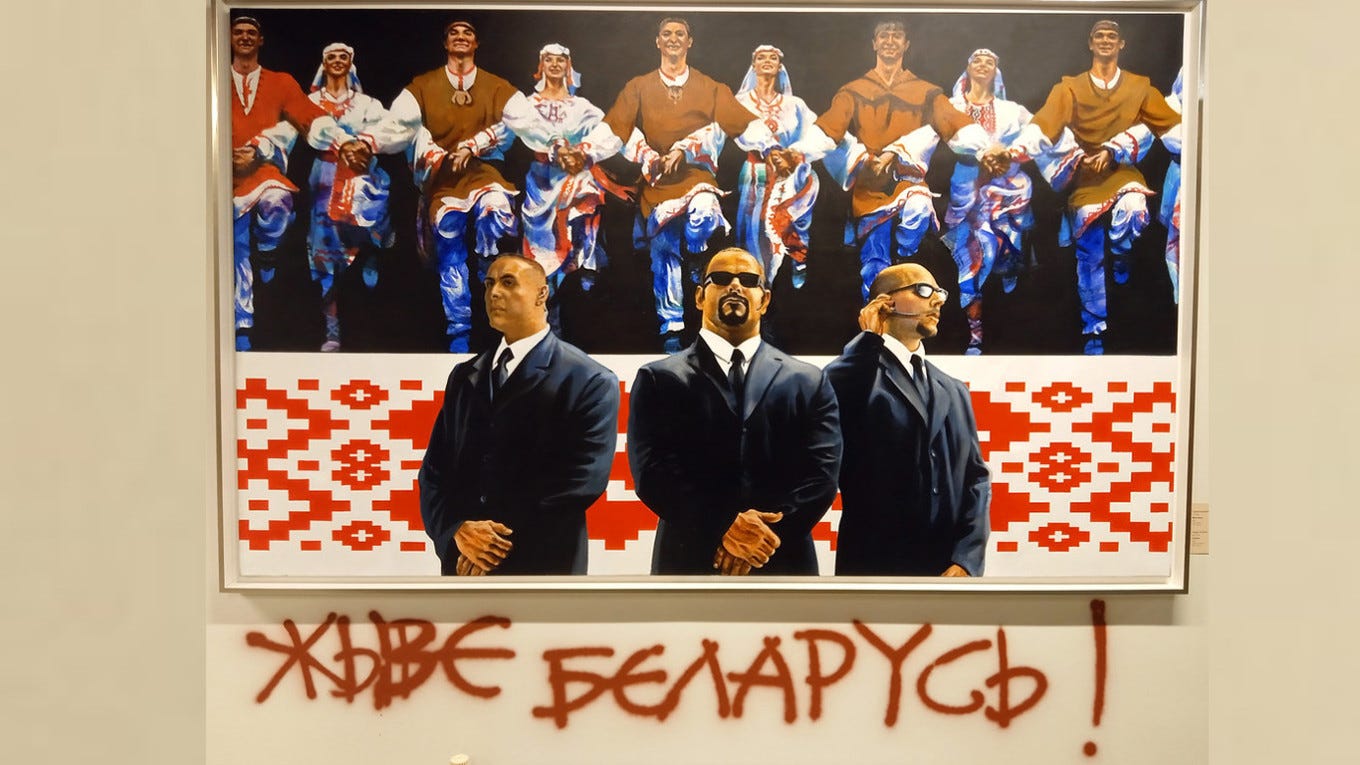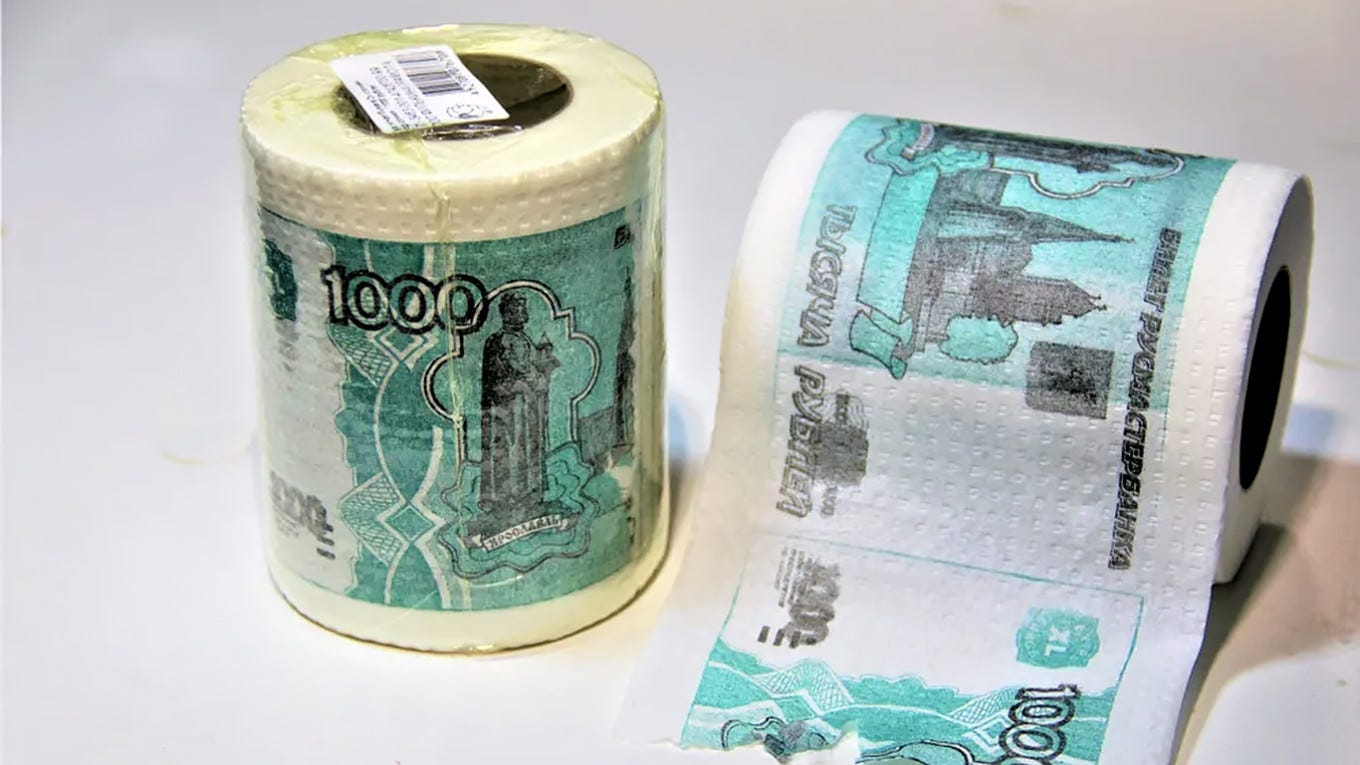Hello from the Bear Market Brief.
This week in the news:
American journalist Evan Gershkovich was convicted of espionage and sentenced to 16 years in Russian prison.
According to new estimates by Re: Russia, the Russian government paid up to 3 trillion rubles to military recruits and their families in the last year.
President Putin signed a new law allowing the government to write off regional debts to the federal government.
Donald Trump’s running mate, J.D. Vance, opposes sending additional U.S. aid to Ukraine.
— Sara Ashbaugh, Editor in Chief
Journalist Evan Gershkovich sentenced
American journalist Evan Gershkovich was sentenced to 16 years in prison for espionage on Friday.
Gershkovich’s trial in the Sverdlovsk Regional Court was held behind closed doors, with no access for the media or the public. This week’s hearing was originally scheduled for August 13, but was moved up unexpectedly following a petition from Gershkovich’s lawyers. Gershkovich was detained in Yekaterinburg in March 2023 for allegedly collecting classified information about the Russian military industrial complex. He and his employer, the Wall Street Journal, vehemently denied the charges, insisting that he was simply a journalist researching regional attitudes toward the invasion of Ukraine. Russian investigators, on the other hand, claim that Gershkovich was on an assignment from the CIA to collect information about Uralvagonzavod, a defense enterprise in the Sverdlovsk oblast.
U.S. authorities declared Gershkovich wrongfully detained in April 2023 and have repeatedly called for his release. Following his sentencing, President Biden gave a statement condemning the verdict and accusing Russia of using Gershkovich as a political pawn. “He was targeted by the Russian government because he is a journalist and an American. We are pushing hard for Evan’s release and will continue to do so,” Biden said. Wall Street Journal publisher Almar Latour and Editor in Chief Emma Tucker also criticized the outcome, saying, “Journalism is not a crime, and we will not rest until he’s released. This must end now.”
Many believe that Gershkovich’s arrest was politically motivated and the Russian government is using him as a bargaining chip in a potential prisoner swap between the U.S. and Russia. In an interview with media personality Tucker Carlson in February, President Putin said that he “does not rule out” releasing Gershkovich. On Thursday, Russian Foreign Minister Sergei Lavrov remarked that Gershkovich’s exchange is being negotiated with U.S. intelligence agencies. “We have irrefutable evidence that Gershkovich was engaged in espionage. The intelligence services of the two countries, by agreement between Presidents Vladimir Putin and Joe Biden back in June 2021, have been in contact to see if someone can be exchanged for someone else,” Lavrov said. It is thought that the Kremlin is looking to secure the release of Vadim Krasikov, an FSB operative currently serving a life sentence in Germany for the assassination of Chechen commander Zelimkhan “Tornike” Khangoshvili. Until then, Gershkovich will be held in a maximum-security penal colony to carry out his sentence.
Meanwhile, another American citizen was also convicted in Russian courts this week. Michael Travis Leake, a Moscow-based musician, was found guilty of drug smuggling on Thursday and sentenced to 13 years in prison. According to prosecutors, Leake was attempting to sell mephedrone and MDMA out of his Moscow apartment. Leake has lived in Russia for many years and is a member of the rock band Lovi Noch. In videos online, Leake appears confused about the charges and says he doesn’t know why he has been detained. In February, the U.S. government urged all American citizens to leave Russia immediately for fear of harassment and wrongful detention.
— Sara Ashbaugh
The Erarta Museum of Contemporary Art in St. Petersburg is facing administrative charges after allegedly displaying “Nazi symbols.” The charges relate to a painting by Belarusian artist Sergei Grinevich called “Festival.” Under the painting is the phrase “Long Live Belarus!”, a slogan that Belarusian activists used to protest the re-election of Alexander Lukashenko in 2020. “Experts concluded that this slogan was the symbol of [two collaborationist units during World War II] along with the Nazi party greeting,” St. Petersburg court system spokesperson Daria Lebedeva said. If found guilty, Erarta faces a fine of up to 50,000 rubles ($567) and Grinevich’s painting will be confiscated. (photo: The Moscow Times)
A new study on the cost of the war
According to estimates published by the research project Re:Russia, the Russian government has paid out approximately 2.75-3 trillion rubles ($31-34 billion) to war participants and their families in the twelve months between July 2023 and June 2024. The estimate—which is based on official recruitment numbers, the number of Russian losses estimated by media outlets (even as the authorities are withholding mortality statistics), and data on the average amount of various remunerations and social aid—includes recruitment bonuses (which are partly paid by regional budgets) and social aid paid to families (part of which is spent on equipment). It is only a fragment of the fiscal expenditures that the Russian government directly or indirectly spends on the war (which includes the state defense order, logistical costs, construction projects, salaries paid in the occupied territories, etc.). Still, it makes up 1.4-1.6% of Russia’s estimated 2024 GDP and around 8% of total federal budgetary spending. A lot of this money, as the researchers highlight, has supported Russia’s consumption boom and the country’s wartime economic growth (domestic consumption is one of the pillars of otherwise lackluster investment activity, according to the Central Bank). To put this number in context, the estimated cost of the renovation of Russia’s crumbling utility networks is 4.5 trillion rubles ($51.3 billion).
Regional governments, which are expected to recruit as many volunteers as they can, have significantly raised bonuses paid out to newly recruited contract soldiers over the past months (in some regions these are over 1 million rubles). The government of Tatarstan now pays a 100,000 ruble ($1,140) bonus to anyone who also “brings a friend” to the recruitment office. Russia’s large military losses and the political risk of a new round of military mobilization compel the Russian government to maintain this pace of recruitment (and spending). An abrupt end to this de facto fiscal stimulus lifting domestic consumption would also likely have a shock effect on the Russian economy. Therefore, budgetary funds allocated to war participants will likely only grow.
— Andras Toth-Czifra
Regional debt
President Putin signed a law that will allow the government to write off debts of regions towards the federal government. According to the law, the government has the right to write off or restructure debts “from state extra-budgetary funds” as well as tax benefits “within the framework of investment projects for the development of the tourism sector.” The exact methodology will be determined by the federal government.
The law essentially extends the federal government’s debt replacement policy from the past years, through which the Finance Ministry replaced loans from the market with significantly cheaper budgetary loans, thus reducing the debt burden of regions. As of 2023, however, this policy had run its course, with more than 77% of regional debt held by the government. Thus, in February, Putin promised to forgive two-thirds of accumulated budgetary loans. The total amount of these is 2.5 trillion rubles ($28.5 billion) according to the Finance Ministry, of which 1.6 trillion ($18.2 billion) will be restructured, saving regions an estimated 200 billion rubles ($2.3 billion) annually in the next three years. In accordance with the increasingly strict supervision of regional budgets, the federal government will likely require regions to put these savings towards specific priorities established by the Kremlin.
Debt restructuring is the latest in a series of measures to put the finances of regional governments and municipalities on more stable footing.
Russia’s economic growth in 2023, fueled by defense orders, meant that many regions saw higher-than-expected revenues from corporate and personal income taxes, their two main sources of income. However, expenditures grew faster, which increased the number of regions in deficit. This year, overall income growth is expected to slow down while inflation remains relatively high. As of May 2024, income tax receipts were still 35.9% above last year’s levels, but corporate tax receipts were 13.9% below. Most regions outside of Russia’s capitals, their agglomerations, and a handful of highly industrialized or energy-rich regions have scarce reserves to speak of. In regards to interbudgetary transfers, the federal government’s focus remains on the occupied territories and, within Russia, infrastructure projects along the Arctic coast and in the Far East. The recent adoption of a law allowing the introduction of tourist taxes is also part of plans to allow (certain) regions to realize more fiscal income. Regions will also be allowed to spend the remainders of federal transfers to finance investments falling under the National Projects. At the same time, the amount of money that regional governments can spend on public-private partnership projects will be limited in an attempt to curb wasteful spending.
While regions cannot go bankrupt, a scarcity of liquid funds can result in regional governments choosing to cut or withhold spending on certain functions that in turn can lead to political risks (e.g. salary hikes of public workers). With the war being the main focus of the federal budget for the foreseeable future, which effectively limits fiscal largesse, the government is trying to curb unnecessary spending and find ways that regions can make savings.
— Andras Toth-Czifra
A Moscow court prohibited the sale of toilet paper with the image of 1000 ruble bills this week. The Preobrazhensky District Court of Moscow determined that the toilet paper “offends religious feelings” because it includes the likeness of Yaroslav the Wise, an 11th-century prince and recently-canonized saint. As a result, the webpages of four online stores selling the toilet paper were banned. “In a free democratic society, the dissemination of illegal information capable of offending the religious feelings of believers cannot be protected by freedom of thought, speech, opinion and information,” the court’s ruling states. (photo: ozon.ru)
Trump’s VP pick’s stance on Ukraine
On Monday, former President Donald Trump announced that he chose Senator J.D. Vance of Ohio as his running mate. The 39-year-old veteran and venture capitalist was elected to the Senate in 2022, becoming a strong proponent of Trump’s MAGA agenda, especially when it comes to foreign policy, immigration, and trade. Interestingly, prior to being elected to the Senate, Vance criticized Trump and even called him “America’s Hitler.”
Vance’s selection immediately raised concerns among Ukrainians as the Ohio Senator has been one of the most vocal opponents of U.S. aid to Ukraine. For instance, three days before the Russian full-scale invasion of Ukraine, then-Senate candidate Vance said in an interview that he does not “really care what happens to Ukraine one way or another.” “I’m sick of Joe Biden focusing on the border of a country I don’t care about while he lets the border of his own country become a total war zone,” he added.
Since the beginning of the war, Vance’s position on Ukraine has not changed. During a debate on the supplemental aid package for Ukraine, the Senator argued that it was not clear where the money for Ukraine was going and strongly opposed any further aid. This spring, he issued an opinion piece in The New York Times arguing that the US lacks the capacity to manufacture the amount of weapons needed by Ukraine to win the war. “I voted against [the supplemental] package in the Senate and remain opposed to virtually any proposal for the United States to continue funding this war. Mr. Biden has failed to articulate even basic facts about what Ukraine needs and how this aid will change the reality on the ground,” wrote Vance.
In his New York Times interview in June, Senator Vance articulated his solution to the war in Ukraine. His proposal includes freezing the conflict along the current territorial lines, guaranteeing Ukraine both independence and neutrality, and providing U.S. security assistance to Kyiv over the long term. In contrast, Kyiv insists that a full withdrawal of Russian troops from all Ukrainian territory is necessary for peace negotiations to begin.
Trump’s running mate pick has also caused controversy among Republicans. “I think J.D. Vance is the worst possible pick, he has no real moral center and clearly just wants power and fame,” former Republican Representative Adam Kinzinger told The Kyiv Independent. “Former President Trump’s selection of Vance is a huge disappointment to all Republicans who want to see Ukraine win, Russia lose, and Putin defeated. Vance has a long history of confusing free, America-loving countries like Ukraine with tyrannical, corrupt, anti-American dictatorships like Russia,” John Conway, Director of Strategy at Republicans for Ukraine, commented.
— Lisa Noskova
On the podcast
Why has the Global South, historically on the receiving end of colonialism and imperialism, maintained what might be called a neutral stance towards Russia's war against Ukraine? Ivan Grek, Director of the Russia Program at George Washington University’s Institute for European, Russian, and Eurasian Studies, joins Aaron Schwartzbaum to discuss.
Quickfire: Regions
On July 11, the Federal Security Service arrested two deputy governors of the Ivanovo Region on charges of corruption related to regional development projects. Several members of the regional government were also reportedly interrogated. It is still unclear whether the arrests are going to cost Ivanovo Governor Stanislav Voskresensky—who is not an Ivanovo native—his job, given that the investigation has so far mostly targeted local officials. It is worth noting, however, that Dmitry Azarov, the Governor of the Samara Region, was recently forced out after a series of corruption cases and similar scandals affecting his government. These cases suggest that the security services may be taking a more active role in regional politics, especially as the federal government is keen to crack down on wasteful regional spending.
An unusually competitive mayoral election is taking shape in Bratsk, a city in the Irkutsk Region which has so far preserved direct mayoral elections. The local chapter of the governing United Russia party supports the current mayor, Sergey Serebrennikov, a former officer of the Federal Security Service. However, another party member, Alexander Dubrovin, who heads the Bratsk district, is now also running as an independent candidate, reportedly with the support of local elites. The Communist Party (KPRF), which has relatively strong positions in the region, supports the candidacy of Elena Kutergina, a local journalist. In the absence of reliable surveys, it is difficult to determine how popular each candidate is; however, the mere fact that three potentially strong local candidates are running hints at conflicts within the local elite.
The independent media outlet Lyudi Baikala (The People of Baikal) released a documentary about the government-sponsored amendments to the law on the protection of Lake Baikal, which will allow increased logging and the appropriation of land for development purposes over the coming years. The draft law has led to protests in regions around the world’s largest freshwater lake (where local conservationist movements had also protested against other industrial developments, e.g. a Chinese bottling plant). The documentary names a series of people whose private business interests are served by the amendments; among them are Irkutsk Senators Andrey Chernyshev and Sergei Brilka, as well as several deputies. Earlier the Kedr project, which investigates environmentally harmful development projects, named steel magnate Oleg Deripaska and Duma deputy Alexander Yakubovsky (whom the new documentary also mentions) as the main direct beneficiaries of the bill through their business interests in the region. While local conservationist movements have achieved some rare successes against the authorities in several regions in recent years, it has also become easier for the government to crack down on these movements by labeling them extremists or a threat to national security. Without at least some allies in the local elite, it seems unlikely that activists will be able to prevent massive logging near the lake.
— Andras Toth-Czifra








